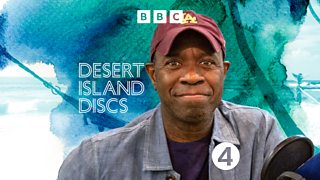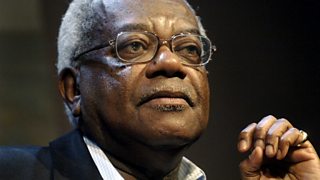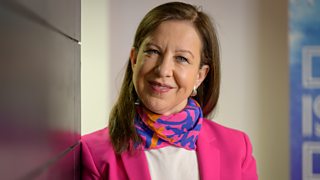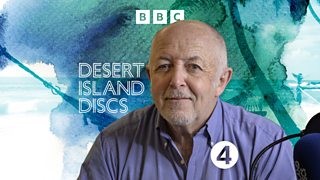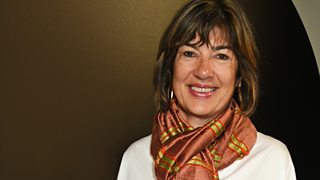Nine things we learned from Clive Myrie's Desert Island Discs
Clive Myrie is an award-winning journalist and broadcaster who is a familiar face on television screens as a presenter of the Βι¶ΉΤΌΕΔ’s news programmes.
He is one of the Βι¶ΉΤΌΕΔ’s most experienced foreign correspondents and has reported from war zones around the world including Afghanistan, Kosovo, Iraq and Ukraine.
In 2021 he took over from John Humphrys as question master of the quiz show Mastermind and he recently fronted a travel series which took him around the Caribbean.
Here are nine things we learned from his Desert Island Discs…
-
![]()
Listen to Clive Myrie's Desert Island Discs
Listen on Βι¶ΉΤΌΕΔ Sounds to hear the episode with full music tracks first.
1. Clive’s war reporting from a Kyiv rooftop led to a royal response
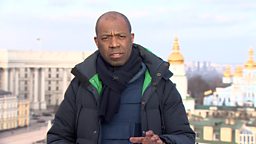
When Clive started reporting from Ukraine in 2022 some viewers only knew him as the presenter of Mastermind and didn’t realise that he had an established career as a foreign correspondent with years of experience reporting from conflict zones.
In war zones, you tend to find the best of humanity and the worst of humanity... it's the mix that makes telling the stories that are involved in conflict so fascinating.
“People came up to me and they say, ‘God, we were so worried about you standing on the roof like that, so exposed,’” Clive says with a smile. At the beginning of the war he and his colleague Lyse Doucet made regular broadcasts from the top of a hotel in the capital Kyiv. Clive says their reports even caught the attention of the then-Prince Charles, who said to him when they met at an event, “Ah, you're the man off the roof!”
Clive says, “In war zones, you tend to find the best of humanity and the worst of humanity. People are horrible, people are violent, but some people are kind and generous and loving, sometimes... You've got this mix and it's the mix that makes telling the stories that are involved in conflict so fascinating.”
2. He discovered his childhood hero watching the television news with his family
Clive’s dad enjoyed watching the ITV news and Clive would sit with him and soon became a fan of presenters Sandy Gall, Reginald Bosanquet and Gordon Honeycombe. But it was another presenter who really caught his attention and inspired him to become a journalist. “None of these [other] people were black. And then one day, [I] turn on the TV, and there's this bloke called Trevor McDonald – and he's off all over the place and he's having fun. And I'm like, ‘Right, it is possible!’”
Seeing Trevor [McDonald] was an event for everybody, not just in our household, but for so many Caribbean households up and down the country, because there was a black guy in a position of authority speaking about serious things.His childhood hero inspired him to be a presenter
“Seeing Trevor was an event for everybody, not just in our household, but for so many Caribbean households up and down the country, because there was a black guy in a position of authority speaking about serious things.”
Clive’s relationship with Sir Trevor has evolved over the years. Clive jokes, “he is so bored of me telling him that [he’s my hero]. He's like… ‘I know you think I'm your hero. That's fine. That's okay. Now let's move on. What are you having to drink?’”
3. Clive’s mum made clothes for a Sixties fashion legend
Although she was a qualified primary school teacher in Jamaica, Clive’s mum, didn’t have the right qualifications to teach in the UK so she became a seamstress.
“She was so good that the bosses allowed her to work from home, which meant that she could bring up me and my other siblings while she was working. So, I remember the lorry arriving in the morning with all the bits [for] the garments... And she made shirts for Marks & Spencer. She made mini-skirts for Mary Quant and [worked for the company that made] Harold Wilson's raincoats.”
But Lynne held onto her teaching ambitions and completed her training at the age of 64, after all her children had left home. “She needed to prove to herself that she could have done it,” Clive says.
4. The front room at home brought Caribbean sunsets to Bolton
Clive was born in Farnworth near Bolton and remembers his parents’ front room which was “festooned in souvenirs… coasters with a map of Jamaica on and remembrances of that other life that my parents had. He describes the front room as a place of refuge.
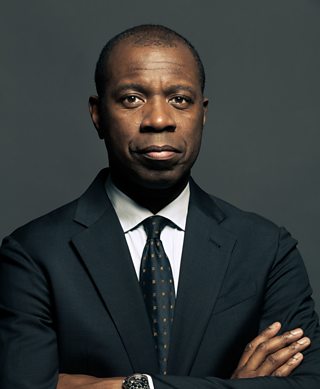
”Being immigrants to this country, and being black, at times could be problematic. And so the front room, with different bottles of rum and the pictures of Caribbean sunsets, and so on, was a safe haven.”
5. Clive’s third disc reflects his passion for opera
“I love the madness of it, the drama. I go to the Opera Festival of Verona every year. We stay in the same hotel, we eat the same food. A lot of the time, we see the same operas that we've done over the last decade or so! But it's just wonderful, and I've got a circle of friends that we all go there, and it is an annual ritual now.”
For his third disc, Clive chooses Soave sia il vento, a well-known aria from Mozart’s opera Così fan tutte, performed by Kiri Te Kanawa, Ann Murray and Ferruccio Furlanetto, with the Vienna Philharmonic.
6. His first posting as a correspondent left a lasting impression
Clive’s first posting as a Βι¶ΉΤΌΕΔ journalist took him to Japan where he visited a leprosy colony to tell the stories of the people who lived there.
“That left a big impression on me. This would have been 1996 and the idea that there were still leper colonies in existence anywhere in the world was just astonishing. “Some [people] had been there since before the Second World War. They'd grown up there.”
“I really wanted to understand the mindset of a society that was so willing to discriminate in that way, in a similar way to the Britain that my parents came to. I hadn't been treated in anywhere near as appalling a fashion as these people [in the leper colonies], but I understood, to a degree, what it meant to be shunned by society and to feel that you weren't valued.”
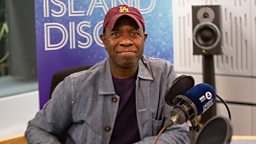
7. A historic US election had a personal impact on Clive
In 2008, Clive covered Barack Obama’s historic US election victory for the Βι¶ΉΤΌΕΔ. He was reporting live from Morehouse College, a renowned black liberal arts college based in Atlanta – the alma mater of many celebrated African-Americans including Martin Luther King Jr and the film director Spike Lee. On that night Clive was surrounded by civil rights activists who had marched with Martin Luther King. “I'm reporting from the South [where] 40, 50 years earlier, black people were being lynched wholesale,” he explains.
When Obama’s win was announced David Dimbleby, presenting in the UK, asked Clive to describe the scene. “I just said, ‘David, everyone's in tears. The whole room is in tears. And Barack Obama is basically standing on the shoulders of so many of the civil rights marchers who are here today’... And then for some reason, at the end of it, I decided to say, ‘and I have to say David, for me, being a black man, to be here at this moment in time in history, in the South, is quite a moment.’”
Clive was concerned that his emotions had got the better of him. “I thought, ‘Oh my God… I've managed to make one of the most important events in modern American history all about me!’” But then he watched the correspondent for America’s ABC News on one of the television screens. “He was broadcasting live to, I don’t know, 25, 30 million people, and tears were streaming down his face. He had no problem, and I thought, ‘I've got no problem. I haven't crossed any line at all. This is how it is!’”
8. Clive says people are always more important than the story
When reporting on crises where people urgently need help, Clive reflects: “You do what any human being would do. I remember covering the flight of the Rohingya Muslims who were being burnt out of their homes by Buddhists in Myanmar. There was a little girl who was wandering around the refugee camp with a baby on her shoulders. She must have been, God, no more than seven or eight and I thought, ‘we've got to do something about this.’”
You can be quite calculated and cold when you're firing a gun... But when you get to great art or literature or music, that is all the internal bits of what it means to be a human being.How art restores his faith in humanity
“So, we put down the cameras and we talked to her and found out that her parents had been killed. And so we took her to the authorities in the camp, and told her story after we tried to do something about her personal situation. The story's important and it's my job, but there are some things that come before that.”
9. His book of choice is inspired by his love of art
Clive says art restores his faith in humanity and he visits art galleries and listens to music after a difficult work trip, “because that shows the other side of what it means to be a human being. You can be quite calculated and cold when you're firing a gun, or pressing the button on a weapons system that's going to destroy a building with people in it. But when you get to great art or literature or music, that is all the internal bits of what it means to be a human being. The creativity, emotion, love, everything is pouring into that work of art, or that finely crafted sentence, or that sonata or that incredibly honed three-minute pop song.”
Clive chooses the catalogue of the Metropolitan Museum of Art in New York for his book.

